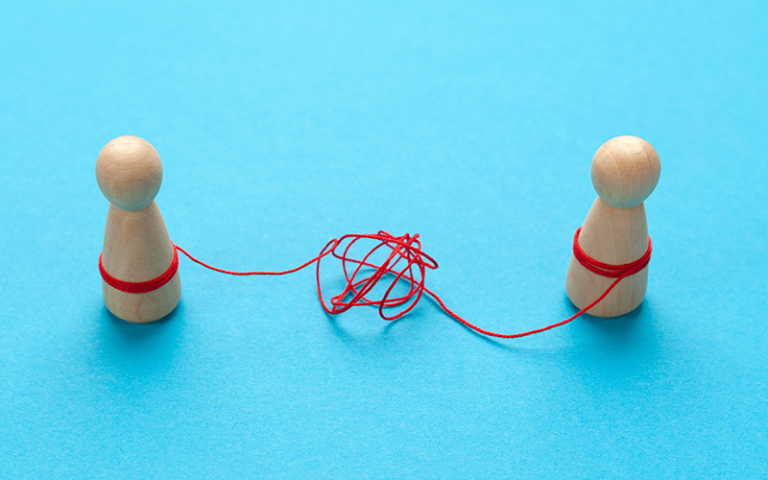Young people want their voices to be heard in learning about relationships, sex and sexuality
27 April 2023
Young people are still too rarely consulted about relationships, sex and sexuality education but have many ideas on what and how they want to learn, finds research conducted by academics from IOE, UCL’s Faculty of Education and Society.

Young people are educating themselves about relationships, sex and sexuality, but they would like to learn more about these subjects in school and have clear ideas on how they would improve relationships and sex education (RSE), according to newly published research.
The research, commissioned by and carried out in collaboration with the NSPCC, aimed to understand how and where young people learn about relationships, sex and sexuality, what they would like to learn more about, and how they seek support and advice.
The research team, led by Professor EJ Renold (Cardiff University) and including Dr Sara Bragg, Professor Jessica Ringrose and PhD student Betsy Milne at IOE, used participatory and creative methods to listen to the perspectives and experiences of young people aged 11-18 years old from across England, Wales and Scotland. The study included a young person's advisory group (YPAG) that helped shape the research methods, contributed to the process of analysis, and co-created outputs including a film and eight data-poems that convey key messages from the report using quotes from the young people.
Young people reference a range of spaces where they learn about relationships, sex and sexuality, including with friends, family, social media, popular culture and school. They are actively engaged in educating themselves to discover the information they want to know.
Many young people say that learning about relationships, sex and sexuality education at school is patchy, awkward, and doesn’t always cover what they want to know. However, many said that they still want to learn about these topics in school because it is “accessible to everyone”. They want to be able to discuss and ask questions about what they are learning in safe and supportive environments and want those who provide RSE to be trained and resourced to make this happen.
Participants express a clear desire to be actively engaged in this area of their education. They have many ideas for change, and would like:
- Adults to educate themselves about young people's lives and experiences.
- Teachers, parents, trusted adults, and peers to show care and compassion for their diverse experiences, be more open-minded, stand up for equity and challenge discrimination.
- Teachers to be provided with resources and support to help them feel more comfortable and confident in what and how they educate.
- The curriculum to be more comprehensive and more closely connected to their own lives and the diverse, real-world experiences of others.
- To be consulted on how they would like to learn and access support in these areas, such as what they think makes a safe, supportive and inclusive learning environment.
One participant, Fenix (age 14), said: “We had one or two lessons on relationships (…) it was only two lessons, but it was just straight marriage, and what the appropriate age to have a child is, stuff like that. They need to do new lessons”.
The findings suggest that listening more carefully to young people’s views could help create more meaningful, useful and positive learning experiences in this part of the curriculum. They aim to guide decision-makers to develop policies, resources, and practices in this area that are informed by what young people are already learning and want to learn.
Dr Bragg said: “Now is a crucial time to take seriously young people’s rights to be consulted on how RSE is provided. Too often what is considered age-appropriate or timely is disconnected from young people’s own perspectives and experiences. Our research is grounded in young people’s everyday lives and shows how they navigate and negotiate learning about relationships, sex and sexuality across diverse contexts, institutional spaces, practices and situations. We hope our research findings will contribute to more meaningful and informed conversations with young people about what matters to them in learning about relationships, sex and sexuality.”
Maria Neophytou, NSPCC Director of Strategy and Knowledge said: “High quality relationships and sex education is absolutely vital in ensuring young people understand healthy relationships, are able to recognise abusive behaviour and know how to seek help. It reinforces that young people have a right to be safe, heard and respected.
“It’s essential that young people are part of the conversation about how relationships and sex education is provided. Our research shows how much young people have to contribute to this conversation. We know teachers have had a lack of support and training in providing RSE. Our Talk Relationships service offers a suite of resources to teachers and has been shown to increase teacher confidence.”
Links
- Read the full report: “We have to educate ourselves: How young people are learning about relationships, sex and sexuality”
- Lay summary, creative outputs and Welsh language version of the report
- Dr Sara Bragg’s academic profile
- Professor Jessica Ringrose’s academic profile
- Centre for Sociology of Education and Equity
- Department of Education, Practice and Society
Image
Credit: Andrii Zastrozhnov / Adobe Stock.
 Close
Close

